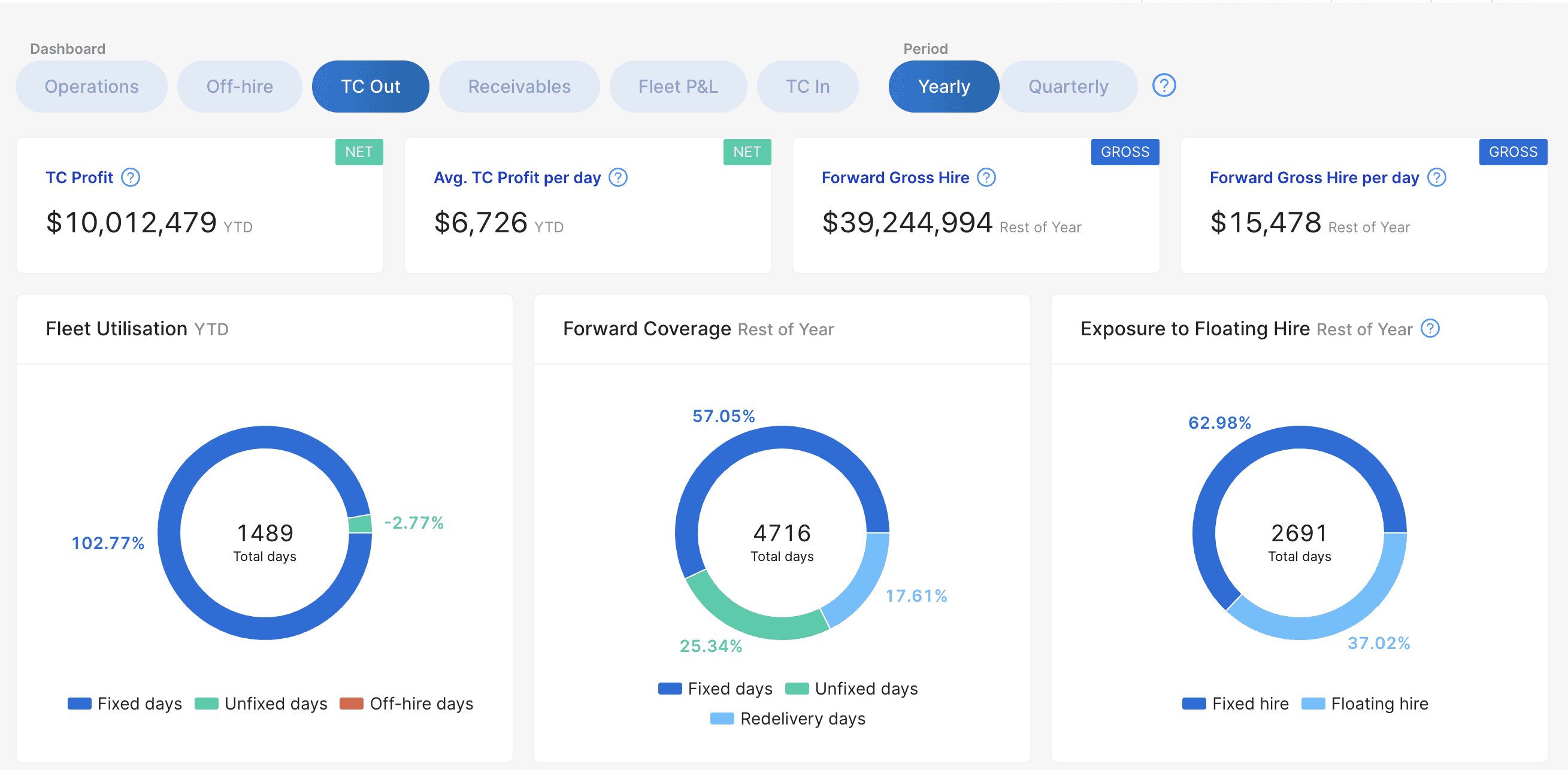Apr 11, 2023
What is a VMS?
A Voyage Management System, or VMS, is an application that can help you handle both the chartering, operations and financial side of owning and operating vessels. Different Voyage Management System software provide different things. Most systems (including ClearVoyage VMS) include:
Fleet list to keep track of every vessel coming in and out of your fleet
Commercial center for handling contracts, cargos and estimates
Voyage center for handling planning, operations and voyage accounting
Contact book to keep track of every charterer, broker and supplier you do business with
Financial center for invoicing, statements, handling payables and receivables
Dashboards to give an immediate overview of the key stats important to you

ClearVoyage VMS also comes with reporting and analytics built-in:
Quarterly or yearly management reporting to give you live commercial results
Voyage performance dashboards for an instant overview of key performance indicators
Customer relationship dashboards to help you track and quantify your relationships with counterparties
CO2 dashboards to monitor and document your environmental performance
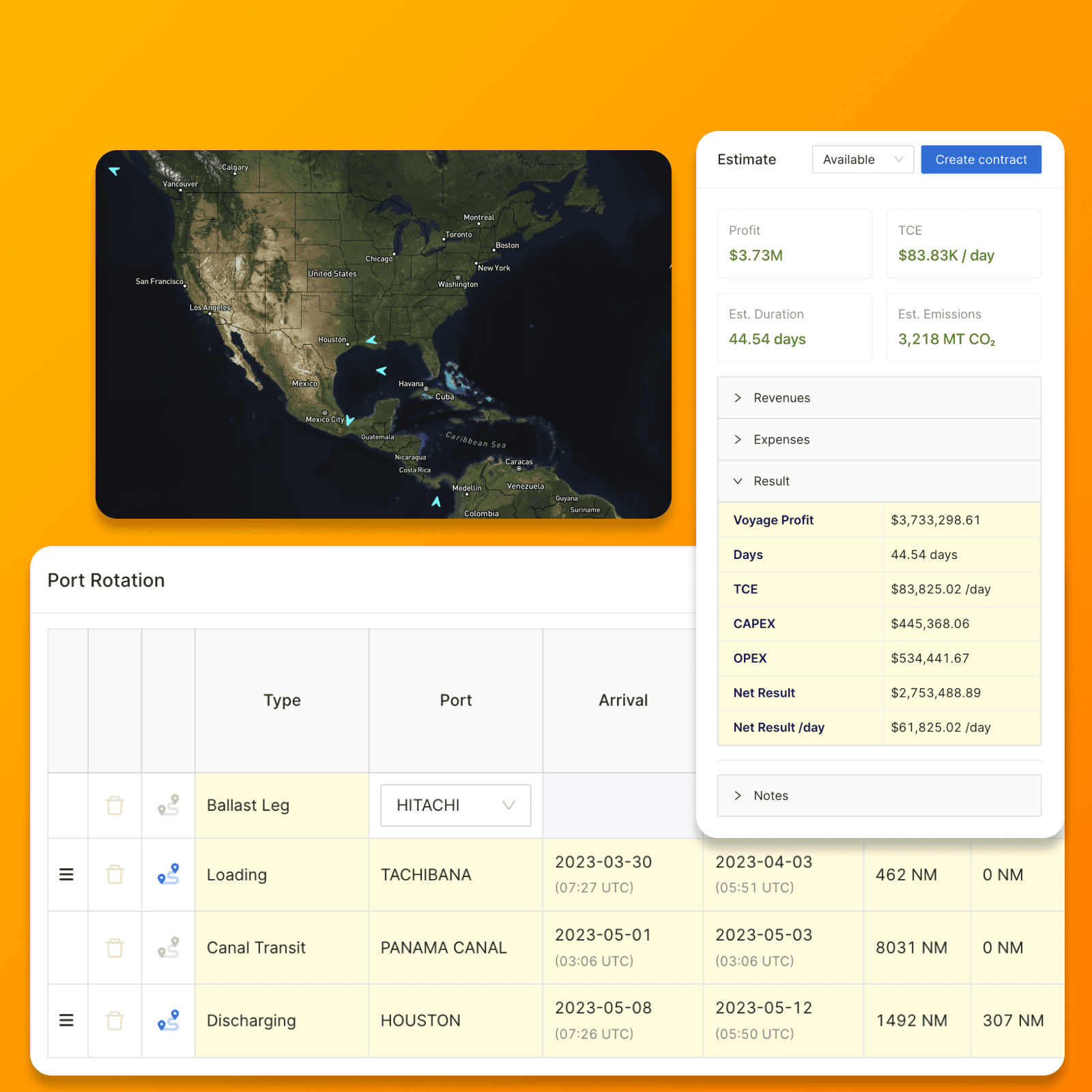
Complexity of modern voyage management
Managing voyages is done across multiple teams, onboard vessels and on shore, in different time zones. Team members need to work seamlessly with each other to negotiate and execute contracts successfully.
It is a complex set of processes. Teams track high volumes of information which is constantly changing. It is also a tightly coupled system: as decisions and events often affect multiple teams. Decisions need to be shared quickly and easily with colleagues.
New regulatory hurdles and the push for decarbonisation of shipping are putting greater pressure on ship owners who face increasing competition to stand out to blue-chip charterers and secure financing from banks.
For a ship owner, being an excellent operator may not be enough going forwards. You need to showcase their operational and environmental excellence in a transparent manner.
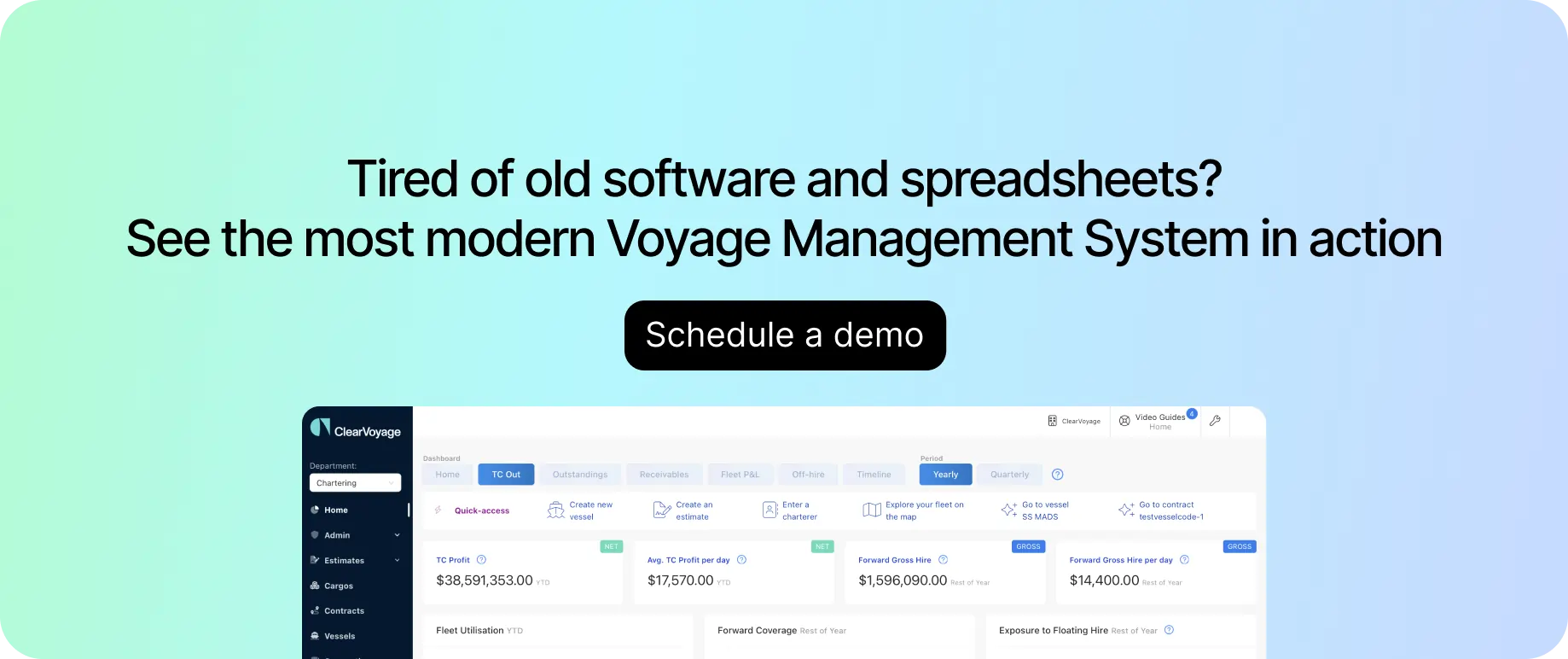
Disconnected systems cost you money
It is possible to operate a fleet in spreadsheets, emails and messenger apps. Many do. So why change?
Yes, keeping critical information in spreadsheets and emails works, to an extent. However, this means your team send each other countless email requests. How often have you experienced long waiting times for data and reports?
The barriers to smooth communication from working in siloed systems mean that your team may not have up-to-date and accurate information. This makes it harder for them to make the best decisions possible and you run the risk of missing key opportunities.
Shipping is a high stakes game. Chartering and operations require many daily decisions to be made, which can all have a huge financial impact on the ship owner. Just a few sub-optimal decisions a year could result in significant loss of revenue.
Working in a shared system allows data to be shared across teams instantly. Seeing data live eliminates the operational risk of keeping data on disconnected systems. A good VMS should put your team in control of decision-making closely matching their work processes and bringing them the insights they need when they need them.
A good VMS should be a platform for you to scale your business, bringing good governance and communication which would otherwise be impossible when trying to scale with spreadsheets and internal emails
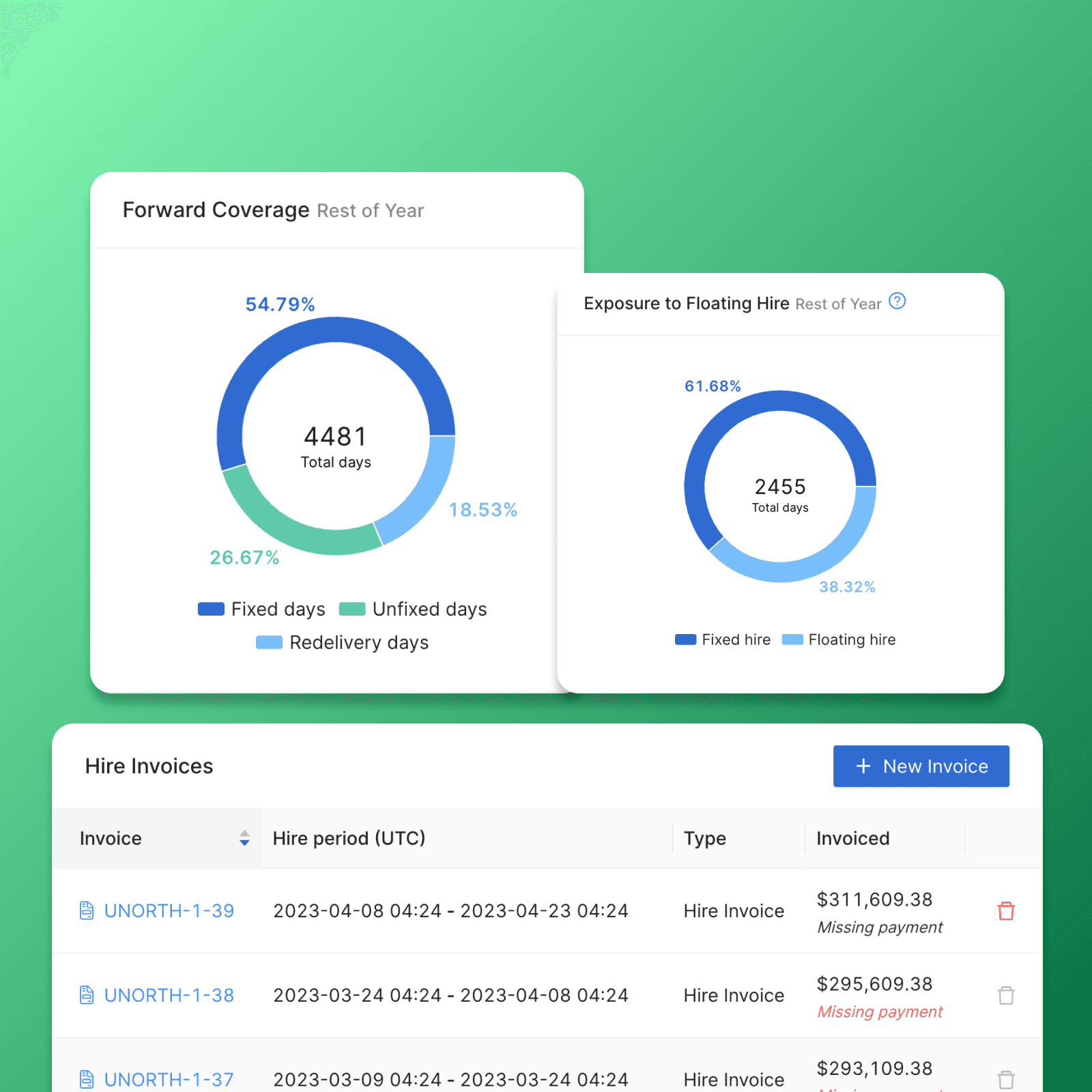
What should I look for?
We believe that there are 7 key characteristics which you should seek from a prospective Voyage Management System. If the VMS has these, you can expect to see significant ROI
1. Flexibility
The system should support your way of working. If that means having a strict approval process or you simply want a different homepage to your colleagues – the system should flex to meet your needs. Not the other way around.
2. Intuitive design
The application must be easy to use. If it isn’t, then your team will not get the full value of the investment. If the system is too difficult, team members may revert to using spreadsheets.
3. Fair pricing
Any VMS should have a transparent and fair pricing structure. Beware of models based on charging significant implementation, training and consulting fees. Does this structure really work in your interest? Or is this another revenue stream for the software company?
4. Transparency built in
Robust audit trails are a must. But more than that, users should be able to quickly identify key facts and events relevant to them. Ask yourself: “if I login to this system at 8am on Monday morning, how do I find out what has changed since I last logged out?
5. Connectivity
Does the VMS have APIs? What third party software does it already connect to? If the VMS is going to fit into your business, connectivity is essential.
6. Easy adoption
What do implementation and onboarding look like? They should be simple, straightforward and if possible, at no or low cost.
7. Security
A VMS will hold all your commercial and operational information, as well as much of your financial data. It is imperative that the application uses industry-leading encryption and security measures such as two-factor authentication.
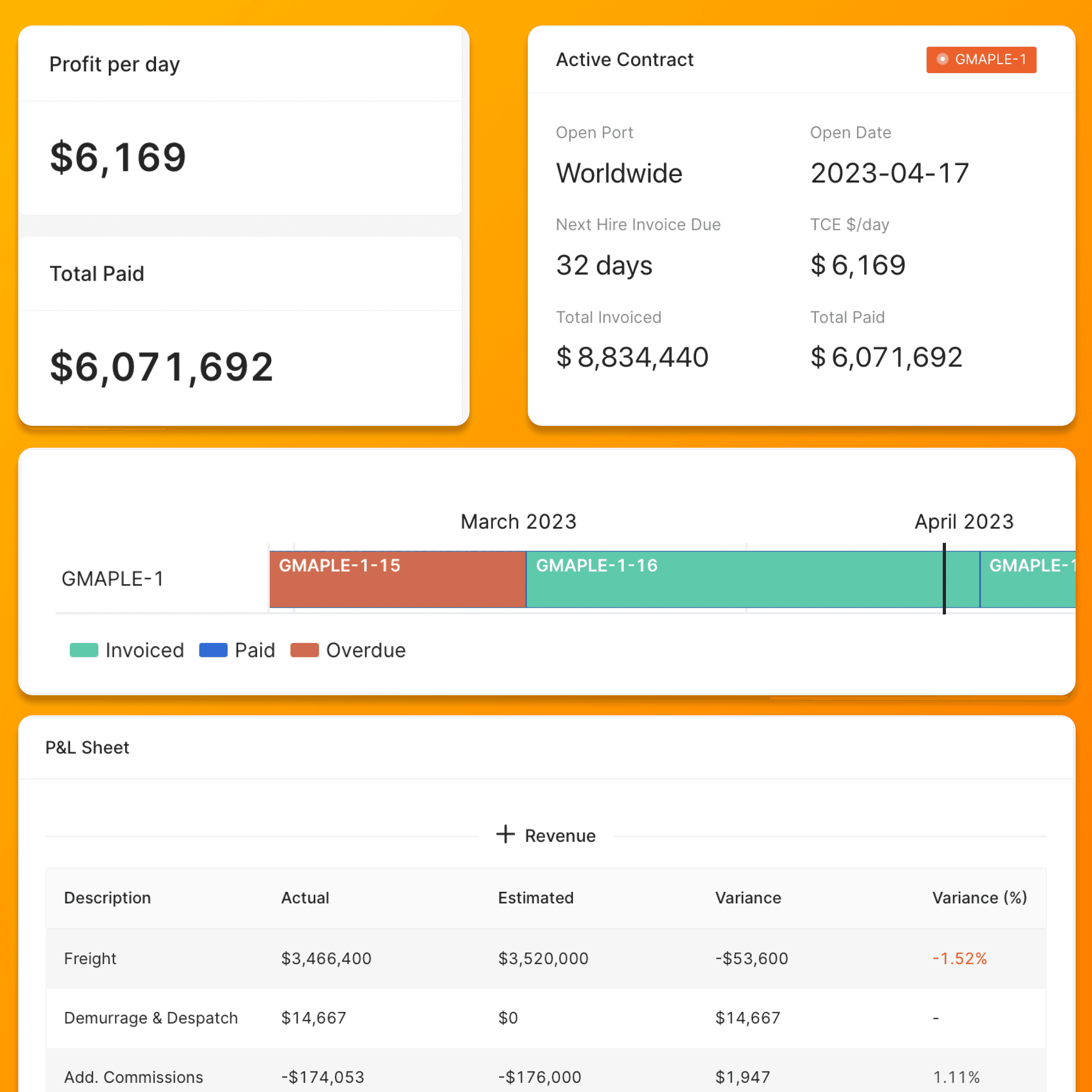
Where Can a Voyage Management System Help?
There are numerous aspects of managing a fleet where a Voyage Management System (VMS) is crucial. Here are some of the key areas:
1. Laytime Management
Laytime, the period allocated for loading and unloading cargo, is a critical component of voyage operations. Effective laytime management can significantly impact a voyage's profitability, as delays can lead to costly demurrage charges. A well-designed VMS, such as ClearVoyage, offers the following benefits for managing laytime:
Real-Time Data Updates: With access to up-to-date information, teams can monitor laytime usage and avoid unnecessary delays.
Automated Alerts: The system provides notifications for approaching deadlines, allowing operators to take proactive measures to keep the voyage on schedule.
Detailed Laytime Calculations: Accurate calculations ensure that teams have a clear understanding of laytime terms and conditions, reducing disputes and improving financial forecasting.
By optimizing laytime management through a VMS, companies can minimize costs, enhance operational efficiency, and increase profitability.
Not sure about the difference between Laytime and Demurrage? We explained it in this article.
2. Time Charter and Voyage Charter Management
Time charters and voyage charters are two common contractual arrangements in the shipping industry. Each requires effective management to ensure profitability and compliance with contractual obligations.
Time Charter Management: Under a time charter agreement, the charterer hires the vessel for a specified period. A VMS helps track vessel performance, monitor usage, and calculate costs associated with the charter period. By leveraging historical data, operators can optimize routes and minimize fuel consumption, maximizing profitability.
Voyage Charter Management: In a voyage charter, the charterer pays for a specific journey. A VMS simplifies the tracking of freight earnings, costs, and key performance indicators (KPIs) associated with each voyage. By providing insights into historical voyages, operators can enhance pricing strategies and make informed decisions about future contracts.
3. Profit and Loss (P&L) Management
Effective P&L management is essential for any shipping operation. A Voyage Management Software streamlines the financial tracking process, allowing operators to:
Monitor Revenues and Expenses: Track all income and costs associated with voyages, including freight charges, port fees, and fuel expenses. This visibility enables operators to identify trends and adjust strategies accordingly.
Analyze Performance Metrics: By utilizing robust reporting tools, you can help operators assess profitability at the vessel, voyage, or fleet level. This analysis aids in decision-making and resource allocation.
Optimize Financial Planning: Historical data and predictive analytics provided by a VMS allow operators to forecast future revenues and expenses more accurately, improving financial planning and budgeting.
4. Voyage Estimation
Accurate voyage estimation is critical for maintaining competitiveness in the shipping industry. A VMS enhances this process by:
Utilizing Historical Data: By analyzing past voyages, a Voyage Management System can provide more accurate estimates for fuel consumption, transit times, and costs associated with future voyages.
Dynamic Routing: Advanced tools enable operators to evaluate various routing options based on real-time data, helping to minimize costs and maximize efficiency.
Scenario Analysis: Allow users to simulate different voyage scenarios, enabling them to make informed decisions based on potential outcomes.
By improving voyage estimation, a VMS enables ship owners and operators to make strategic decisions that enhance profitability.
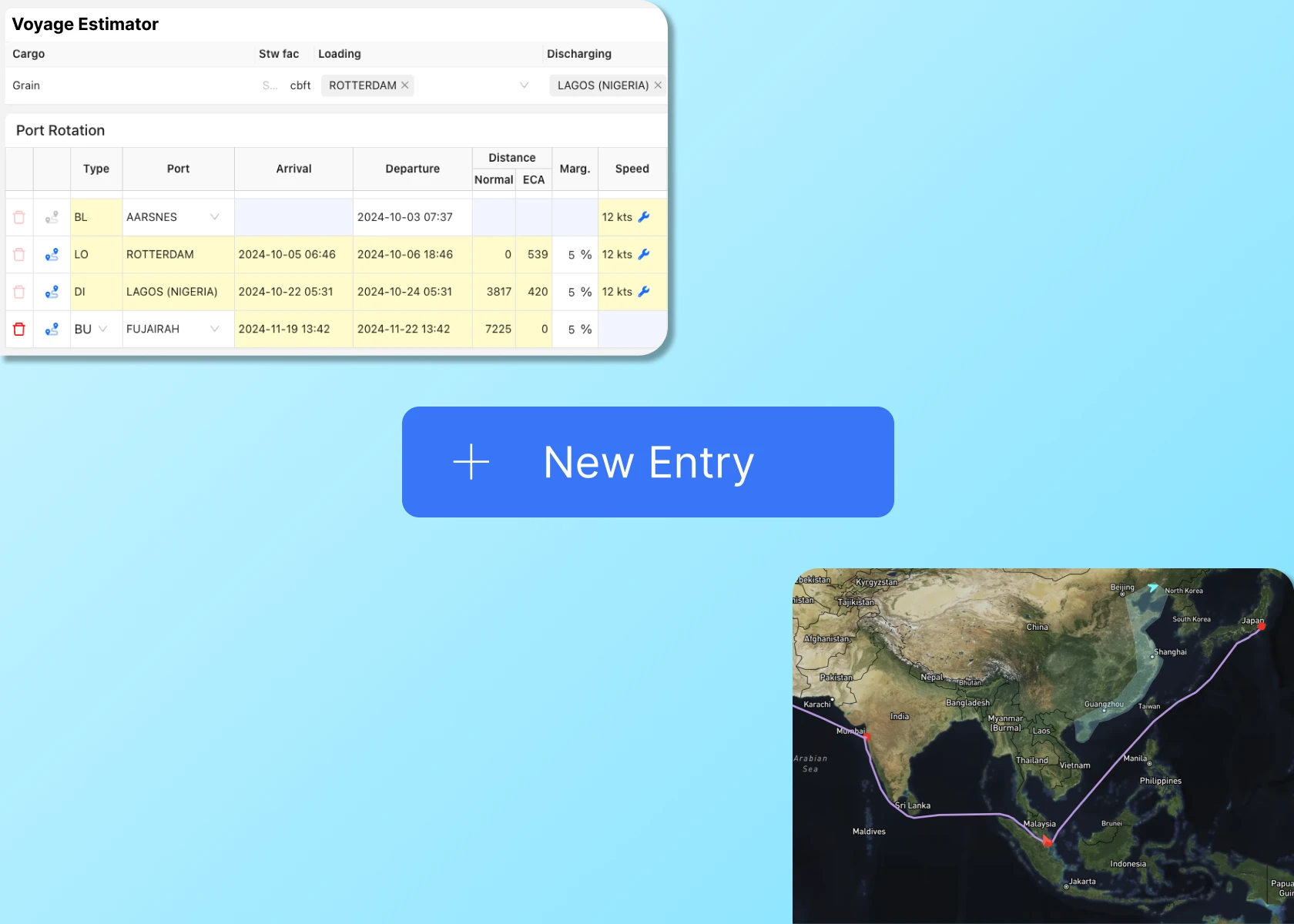
5. Voyage Accounting
Voyage accounting is a critical process that involves tracking all financial activities associated with a vessel's journey. A VMS supports this process through:
Centralized Financial Data: A VMS consolidates financial information related to voyages in one place, minimizing errors and improving accuracy. This centralized approach also facilitates better collaboration among teams.
Automated Reporting: Generate financial reports quickly and easily, ensuring that stakeholders have access to accurate and timely information regarding voyage performance and costs.
Regulatory Compliance: Many VMS solutions include features that assist with compliance, ensuring that operators meet industry regulations and reporting requirements without hassle.
Voyage Charter Parties
Voyage charter parties are a key aspect of shipping, particularly when dealing with bulk cargo or specialized routes. A voyage charter party is a contract between the shipowner and the charterer, where the owner agrees to carry a specified cargo between two or more ports. Managing these contracts effectively is crucial, as they define the responsibilities, terms, and costs associated with a voyage.
ClearVoyage helps you manage voyage charter parties by centralizing all contract-related information in one platform. With an integrated system, operators can easily track contract terms, laytime agreements, freight rates, and associated costs. This ensures that you stay on top of every detail, avoiding potential disputes or delays.
By using ClearVoyage for voyage charter party management, you not only streamline contract handling but also improve decision-making. You can access historical data, track performance, and use this information to negotiate better terms for future charters.
EU ETS and Compliance
With growing regulatory pressure to reduce carbon emissions, the European Union Emissions Trading System (EU ETS) has become a significant factor for shipowners and operators. The system requires vessels operating within the EU to monitor, report, and verify their CO2 emissions, with penalties for non-compliance. For shipping companies looking to remain competitive, it is essential to stay compliant with these regulations while minimizing their environmental impact.
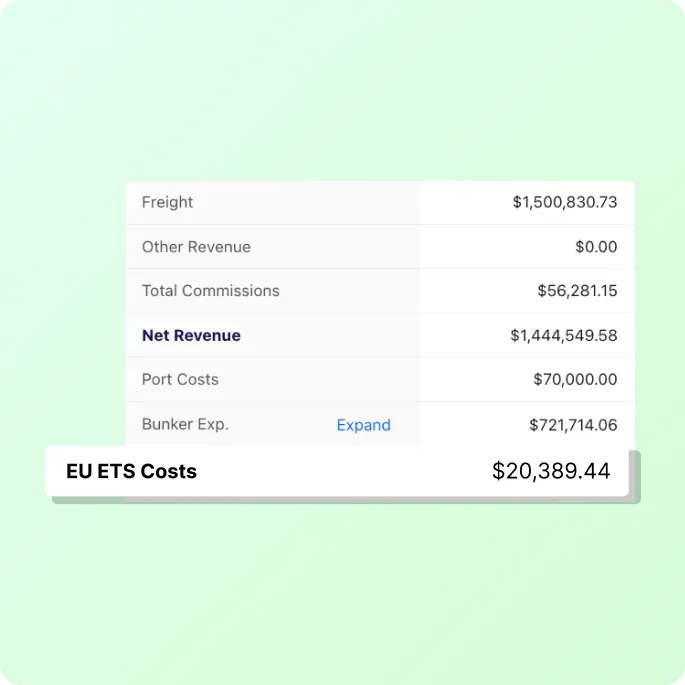
ClearVoyage offers built-in tools to help shipowners and operators meet EU ETS compliance requirements. The system includes CO2 tracking and emissions reporting features that allow you to monitor your environmental performance in real-time. Additionally, the platform provides automated compliance reports, saving your team valuable time and ensuring that you stay ahead of regulatory deadlines.
By leveraging ClearVoyage, your team can focus on optimizing operations while staying compliant with environmental regulations. This not only helps you avoid costly penalties but also positions your fleet as an environmentally responsible option for charterers.
Optimize your Voyage Management Workflows
Having your team from chartering to accounting in the same platform reduces errors and enhances decision making. Having one platform where everybody works from also reduces risk by having one source of truth when it comes to data. In short this enhances your shipping workflows, for a more streamlined and smooth operation.
Time Charter Equivalent (TCE) and Its Role in Voyage Management
Time Charter Equivalent (TCE) is a critical performance metric in the shipping industry that allows operators to evaluate the profitability of their voyages. Understanding TCE helps shipowners and charterers make informed decisions regarding fleet operations, pricing strategies, and overall financial health.
Importance of Time Charter Equivalent (TCE)
TCE represents the daily earnings of a vessel, adjusted to account for various voyage-related expenses. It provides a standardized way to compare the financial performance of different charter agreements, making it easier to assess the effectiveness of operational strategies.
Why is TCE Important?
Performance Assessment: By normalizing earnings, TCE allows operators to assess vessel performance against industry benchmarks. This insight enables shipowners to identify which routes and operations are yielding the best returns.
Pricing Strategies: TCE helps in determining competitive freight rates by providing a clear picture of how much a vessel can earn daily. This ensures that operators can maximize profitability while remaining attractive to potential charterers.
Financial Planning: By analyzing historical TCE data, shipping companies can forecast future revenues and expenses, enhancing their budgeting and financial strategies.
How ClearVoyage Supports TCE Management
ClearVoyage incorporates TCE calculations into its suite of tools, allowing for seamless integration with other voyage management processes. The platform provides:
Real-Time TCE Insights: Access to real-time TCE calculations ensures operators can quickly evaluate earnings performance throughout the voyage.
Detailed Reporting: Comprehensive reporting features help stakeholders understand TCE trends over time, aiding in strategic decision-making.
Data-Driven Strategies: With integrated analytics, ClearVoyage empowers operators to leverage TCE insights for optimizing routes and improving overall fleet performance.
In summary, effectively managing Time Charter Equivalent (TCE) is essential for enhancing profitability in shipping operations. By utilizing ClearVoyage, shipowners can make informed decisions that drive financial success and operational efficiency.
Noon Reports
Noon reports are essential tools for monitoring the operational status of a vessel during its voyage. Submitted daily, typically at noon UTC, these reports provide critical information about the vessel’s position, speed, fuel consumption, weather conditions, and any other relevant operational data. A Voyage Management System (VMS) can streamline the process of creating and managing noon reports, offering significant advantages such as:
Standardized Reporting: A VMS can provide a predefined noon report format that ensures all relevant data is captured consistently, reducing the risk of errors or omissions.
Real-Time Data Collection: With a VMS, data can be collected automatically from onboard systems, minimizing manual input and ensuring that the reports reflect the most accurate and up-to-date information.
Centralized Access: Noon reports generated within a VMS are stored in a centralized location, making it easy for all stakeholders to access and review the information as needed.
Automated Alerts: The system can provide alerts for any discrepancies or issues noted in the noon report, allowing operators to address potential problems proactively.
Performance Analysis: By compiling data from noon reports over time, a VMS can help identify trends in vessel performance, fuel efficiency, and weather impacts, informing better decision-making and operational strategies.
By integrating noon reports into a VMS, shipping companies can enhance their operational oversight and ensure that they are making informed decisions based on accurate, timely data.
Statement of Facts (SOF)
The Statement of Facts (SOF) is a critical document in maritime operations, detailing the events and timings during a vessel's stay in port. It is vital for calculating laytime and demurrage, thus impacting the financial outcome of a voyage. Managing SOF effectively can prevent costly disputes and ensure transparency between all parties involved.
A robust Voyage Management System (VMS), such as ClearVoyage, can support efficient SOF management by:
Automating Data Collection: The system automatically logs key events during the vessel’s port stay, including berth times, cargo operations, and any delays.
Enhanced Accuracy: By centralizing data entry and reducing manual input, the risk of errors in SOF is minimized, leading to more accurate laytime calculations.
Real-Time Updates: Port activities are updated in real-time, ensuring all stakeholders have access to the most current data, helping to prevent disputes and delays.
Dispute Resolution: Detailed SOF reports generated within the VMS provide transparent evidence to resolve potential laytime disputes quickly.
By using a VMS for SOF management, shipping companies can streamline their port operations, ensure accurate record-keeping, and reduce financial risks.
Looking for a Voyage Management System (VMS)?
Schedule a demo with ClearVoyage, and we can talk about your shipping business' needs. Click right here and book a demo today.
